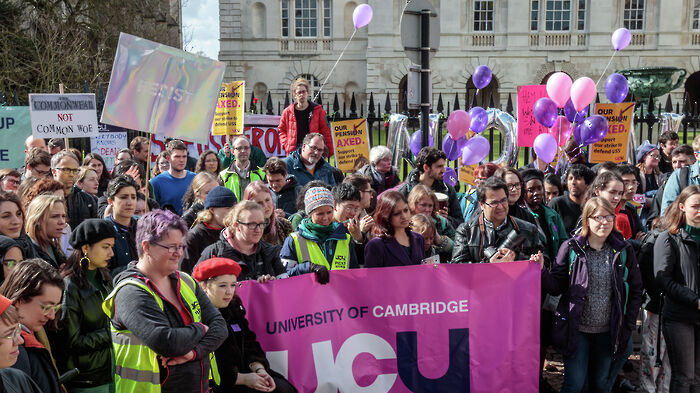USS fossil fuel investments fall due to pandemic
Direct investments were worth over £1b in February 2020, before being hit by falling stock market values due to coronavirus

The Universities Superannuation Scheme (USS) retains substantial investments in oil and gas companies, despite a significant fall in the value of fossil fuel stocks as a result of the Covid-19 pandemic.
At the start of 2020, the USS had direct investments in fossil fuels worth over £1 billion.
The scheme provides pensions for over 450,000 members working in higher education across the country, including at the University of Cambridge.
According to information available on the USS website, the scheme had investments worth £86.35 million in Royal Dutch Shell Ltd. and £106.71 million in India-based Reliance Industries as of 30th September 2020.
Only figures for the USS’ top 100 public investments are publicly available. In February, there were a total of nine oil and gas companies in the list of top 100 investments. Shell and Reliance are the only companies that have not since dropped out of the list.
According to figures seen by Varsity, in February 2020 the investments in Shell were worth £498 million. Investments in oil and gas companies which have since fallen out of the top 100 include a combined £234 million in US-based companies Pioneer Natural Resources and EOG Resources, and £110 million in Sweden-based Lundin Petroleum.
When asked to explain the decrease in the value of USS investments in oil and gas companies leading up to September 2020, a USS spokesperson told Varsity: “The global stockmarket was heavily affected by the pandemic with oil and gas stocks specifically being hit by the impact of lockdowns and travel bans in many parts of the world.”
The spokesperson said the USS does “not exclude oil or gas companies” from its investments. But they pointed to the fact that in June the USS committed to divesting from companies involved in tobacco manufacturing, thermal coal mining, and the production of controversial weapons within two years.
“We believe that climate change will have a profound impact on society and on the value of investment portfolios,” the spokesperson continued. They added that instead of ruling out investments in coal and gas, “we would rather seek to influence those who, at a regulatory or corporate level, are playing a critical role in bringing about a lower carbon economy.”
The spokesperson noted that the USS is part of the Climate Action 100 Group, which has successfully pressured Shell to pledge to become a net-zero emitter by 2050.
However, members of the campaign to Divest USS have repeatedly accused the USS of voting against shareholder motions to encourage fossil fuel companies to divest.
In June 2020, Professor William Spence of Queen Mary University wrote that “documents on the USS website itself show that in every single motion relating to climate change at Shell AGMs since 2010, the USS has voted with the company.”
Meanwhile, in a letter seen by Varsity, Professor Paul Kinnersley of Cardiff University wrote to Dame Katharine Barker, the USS Chair, upon her appointment in January 2020, that the USS “has not made a clear commitment to avoid investment in high carbon activities in the future and has voted repeatedly against shareholder motions at the AGM pressing Shell to comply with the Paris Agreement.”
Professor Kinnersly told Varsity that there is “no evidence” to suggest that the USS has adopted an ethical investment policy regarding oil and gas. He said: “I think students should be making a big noise about USS's investments in fossil fuels as it is your fees that fund the staff pensions ... if these funds are accelerating climate change then it is also the students who will suffer the consequences.”
The Cam SU Ethical Affairs campaign told Varsity: “We disagree with staff pensions being used to fund the destructive and ecocidal fossil fuel industry and stand in solidarity with staff and students fighting to divest the USS. While the University of Cambridge divestment [pledge in October 2020] was a welcome (but long overdue) step in the right direction, we urge the University to lobby against USS investment in fossil fuels.”
They continued: “The climate justice themed day in the last round of UCU strikes is evidence that the fight for fair pensions and for climate justice go hand in hand. Our University must not exploit its staff or the planet, which is why we also call for the protection of staff pensions (alongside better pay and fair working conditions) which we believe can be achieved without USS investment in fossil fuels."
Elsewhere, the University of Bristol issued a joint statement with Bristol UCU and the University of Bristol’s Students’ Union in February 2020 calling for the USS to divest.
The letter argued that: “USS’ current investments in fossil fuel companies are supporting activities that pose a material risk to our planet. This element of USS’ investment strategy appears to be contrary to the USS Trustees’ claim that the ‘scheme is run on a sustainable basis’.”
A University of Cambridge spokesperson told Varsity: “it is for the trustee of the USS (and any other trust-based pension scheme) to determine the investment policy for the scheme.”
Between 2018 and 2020, staff and students in Cambridge engaged in successive rounds of strike action in protest against increases in employee pension contributions and controversial valuations of the USS.
Varsity has contacted Cambridge UCU for comment.
 News / News in Brief: Postgrad accom, prestigious prizes, and public support for policies11 January 2026
News / News in Brief: Postgrad accom, prestigious prizes, and public support for policies11 January 2026 Comment / Will the town and gown divide ever truly be resolved?12 January 2026
Comment / Will the town and gown divide ever truly be resolved?12 January 2026 Comment / Plastic pubs: the problem with Cambridge alehouses 5 January 2026
Comment / Plastic pubs: the problem with Cambridge alehouses 5 January 2026 Lifestyle / The only party girl in the East Midlands12 January 2026
Lifestyle / The only party girl in the East Midlands12 January 2026 News / 20 vet organisations sign letter backing Cam vet course13 January 2026
News / 20 vet organisations sign letter backing Cam vet course13 January 2026









